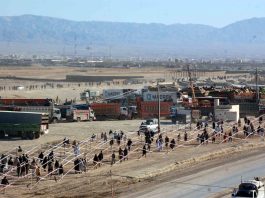Khyber Agency: When Wilson Wazir Masih passed the tenth grade in 1992, he needed a domicile certificate proving his residency of the tribal belt along Pakistan’s frontier with Afghanistan.
Wilson went to the assistant political agent’s office in Landikotal, the main town in Khyber Agency, asking for the certificate so he could get admission into a tertiary college. His request was refused. The administrator told him that only Muslim residents of the Federally Administered Tribal Areas (FATA) were entitled to a certificate.
Wilson’s family had lived in FATA for several generations. But that was not enough to entitle him to a residency certificate.
“Here was I, someone who had lived all his life in Khyber Agency, suddenly told that I had no claim to citizenship in FATA,” Wazir told News Lens at his house in Landi Kotal.
The suffix Masih – and his name – suggests he’s Christian. Wilson has also adopted the clan name Wazir, after one of the leading tribes of Waziristan. This integration into the tribal society on part of members of religious minorities is not new. Sikhs who have lived in Khyber Agency for hundreds of years have embraced the identity of the Afridi clan, indicating their devotion to the tribal identity of the place.
“That day I came to know that all members of the religious minorities were denied the domicile. This is one of the reasons why they remained deprived of high education,” Wazir said. Not having a domicile certificate also meant they could not get jobs or buy land even though they had lived in FATA for generations.
The realization marked a turning point in the life of young Wilson Wazir.
“It stirred in me the spirit to serve non-Muslims. I resolved to work for domicile rights for non-Muslims so they could pursue higher studies, as it was key to their progress,” he said.
Wazir’s belief in education as emancipation is reflected in his own pursuit of studies and his choice of career despite the poverty and discrimination that keeps minorities in Pakistan at the lowest strata of the society.
He graduated with a masters degree in chemistry in 2001 and with a second masters, in education, in 2007.
He taught at the Army Public School and College Landi Kotal for 10 years before resigning to focus on social work for the welfare of religious minorities in the seven tribal agencies and six frontier regions that make up FATA.
“I quit my job in 2010 to concentrate on social activities for religious minorities in FATA living with hardships,” said Wazir.
Due to conflict and militancy, they had been living in fear and could not speak up for their rights.
Born into a poor family, Wilson Wazir is the first man in the Christian community to raise his voice for the rights of non-Muslims in FATA. He runs the All Fata Social Welfare Minority Organization, promoting the welfare and rights of marginalized minorities in the neglected and conflict-battered region where even Muslim residents suffer discrimination and have to struggle for the same rights available to citizens in the rest of Pakistan.
Years of effort by Wazir finally paid off when religious minorities got permanent resident rights in 2015. According to Wazir, it will help them get admission in schools, colleges, universities and access decent jobs. Minorities, who couldn’t vote in elections, got the right to vote in 2002, 2008 and 2013 after Wilson took up the issue with the authorities.
“There were no scholarships for non-Muslim students in FATA. Now they are getting assistance on religious occasions like Christmas and Easter,” says Wazir.
“The implementation of minority quota in government jobs was also a challenge but our organization has ensured federal jobs for non-Muslims. They are now given jobs in the Levies and Frontier Corps. First our people were only appointed as sweepers but now they are getting clerical, medical and nursing jobs in various government and private organizations.”
In recognition of his services for the welfare of religious minorities, Wazir has been nominated as a Malik, the official title for a tribal representative elder, by non-Muslim community last year. It was for the first time ever in the history of FATA that a Malik was nominated from the non-Muslim community. In FATA, tribal Maliks are nominated on the basis of experience and great knowledge.
Daud Masih, 32, a Christian resident of Landi Kotal, said that through his commitment to the welfare of religious minorities in FATA, Wilson Wazir had given a good name to their community and they were proud of him.
“He not only raised voice for his own community but for the rights of non-Muslim in the entire FATA. He has established a network for social work and assisting helpless people,” Masih told News Lens Pakistan.
Even though it’s not their tradition, the men bow humbly before they leave Wilson, a reflection of the ancient Wazir and Afridi tribes whose names they have adopted. For the ageing retired men who have worked at low-paid government positions at the agency, retaining government houses is vital as they cannot afford to rent one.
Wilson Wazir estimates the total population of minorities in FATA and Frontier Regions is around 30,000, including 15,000 Christians, 8,000 Sikhs, and 5,000 Hindus.
In recognition of his services for the religious minorities, Wilson also received the Sitara-i-Imtiaz, Pakistan’s third highest civilian award, in March last year.
“It was the proudest day for my family and my community and a recognition of years of efforts,” he said,
“People often said I was wasting my time with useless activities. I told them I was not working for a reward but to serve helpless people. The announcement of this award has been a fillip to the morale of other people working in the social sector. They now work with more vigour and zeal.”
Wilson Wazir said social work was difficult work as people often suspected social workers of working for their own interests.
“I am a patriotic Pakistani and believe in harmony between Muslim and Non-Muslims across the world,” said Wilson.
“I am proud that I was selected for such a big award on the basis of my services to the community.”



